Paul Lynde
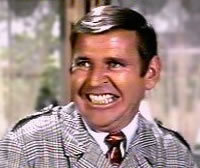
Paul Lynde (June 13, 1926 – January 10, 1982) was an American comedian and actor. A noted character actor, Lynde was well known for his roles as Uncle Arthur on Bewitched and Harry McAfee, the befuddled father in Bye Bye Birdie. He was also the regular "center square" guest on the game show Hollywood Squares from 1968 to 1981.
The Kids in the Hall
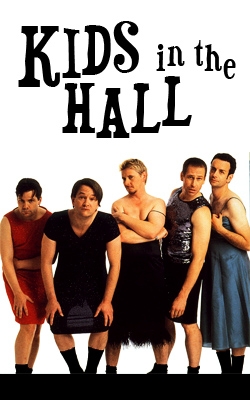
The Kids in the Hall is a Canadian sketch comedy group formed in 1984, consisting of comedians Dave Foley, Kevin McDonald, Bruce McCulloch, Mark McKinney, and Scott Thompson. Their eponymous television show ran from 1988 to 1994 on CBC in Canada, and 1989 to 1995 on CBS and HBO in the United States. The theme song for the show was the instrumental "Having an Average Weekend" by the Canadian band Shadowy Men on a Shadowy Planet. The troupe made one movie, Brain Candy, which was released in 1996.
The name of the group came from Sid Caesar, who, if a joke didn't go over, or played worse than expected, would attribute it to "the kids in the hall," referring to a group of young writers hanging around the studio.
The name of the group came from Sid Caesar, who, if a joke didn't go over, or played worse than expected, would attribute it to "the kids in the hall," referring to a group of young writers hanging around the studio.
Tim Conway
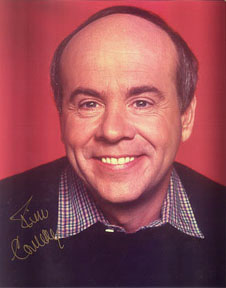
Tim Conway (born December 15, 1933) is an American comedian and actor, primarily known for his roles in sitcoms, films and television. Conway is best-known for his roles as Lt. Quinton McHale's (played by Ernest Borgnine) inept second-in-command officer, Ensign Charles Parker, in the popular 1960s WWII sitcom, McHale's Navy, and for co-starring alongside Carol Burnett on The Carol Burnett Show.
Mick Foley
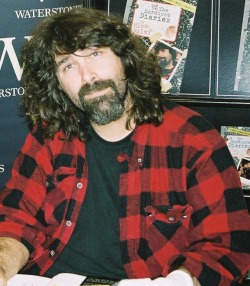
Mick Foley (born June 7, 1965) is an American actor, author, comedian, voice actor, and professional wrestler.
He has worked for many wrestling promotions, including World Wrestling Entertainment (WWE, formerly World Wrestling Federation), World Championship Wrestling (WCW), National Wrestling Alliance (NWA) and Extreme Championship Wrestling (ECW), and currently Total Nonstop Action Wrestling (TNA). He is often referred to as "The Hardcore Legend", a nickname he shares with Terry Funk.
Throughout his wrestling career, Foley has wrestled both under his real name and under various personas (most notably Cactus Jack, Mankind and Dude Love). He was the first ever WWF Hardcore Champion and he also became a three-time WWF Champion as Mankind throughout his WWF career. He has also won the WWF Tag Team Championship eight times, the ECW World Tag Team Championship two times, and the WCW World Tag Team Championship one time. Following his retirement from a full-time wrestling schedule, Foley appeared occasionally with WWE as a special guest referee and, later, a color commentator for the SmackDown brand. Upon his departure from the company in 2008, he signed with TNA, where he was the storyline majority stock holder of the company. There, Foley has held the TNA World Heavyweight Championship and the TNA Global Championship.
In addition to wrestling, Foley is a multiple-time New York Times bestselling autobiographer. He was also a subject of the documentary Beyond the Mat, which followed him at the peak of his career. More recently, he has signed on for Bloodstained Memoirs, another wrestling documentary.
He has worked for many wrestling promotions, including World Wrestling Entertainment (WWE, formerly World Wrestling Federation), World Championship Wrestling (WCW), National Wrestling Alliance (NWA) and Extreme Championship Wrestling (ECW), and currently Total Nonstop Action Wrestling (TNA). He is often referred to as "The Hardcore Legend", a nickname he shares with Terry Funk.
Throughout his wrestling career, Foley has wrestled both under his real name and under various personas (most notably Cactus Jack, Mankind and Dude Love). He was the first ever WWF Hardcore Champion and he also became a three-time WWF Champion as Mankind throughout his WWF career. He has also won the WWF Tag Team Championship eight times, the ECW World Tag Team Championship two times, and the WCW World Tag Team Championship one time. Following his retirement from a full-time wrestling schedule, Foley appeared occasionally with WWE as a special guest referee and, later, a color commentator for the SmackDown brand. Upon his departure from the company in 2008, he signed with TNA, where he was the storyline majority stock holder of the company. There, Foley has held the TNA World Heavyweight Championship and the TNA Global Championship.
In addition to wrestling, Foley is a multiple-time New York Times bestselling autobiographer. He was also a subject of the documentary Beyond the Mat, which followed him at the peak of his career. More recently, he has signed on for Bloodstained Memoirs, another wrestling documentary.
Edgar Allan Poe
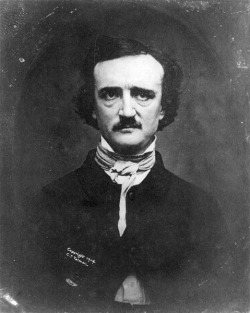
Edgar Allan Poe (January 19, 1809 – October 7, 1849) was an American writer, poet, editor and literary critic, considered part of the American Romantic Movement. Best known for his tales of mystery and the macabre, Poe was one of the earliest American practitioners of the short story and is considered the inventor of the detective-fiction genre. He is further credited with contributing to the emerging genre of science fiction. He was the first well-known American writer to try to earn a living through writing alone, resulting in a financially difficult life and career.
He was born as Edgar Poe in Boston, Massachusetts; he was orphaned young when his mother died shortly after his father abandoned the family. Poe was taken in by John and Frances Allan, of Richmond, Virginia, but they never formally adopted him. He attended the University of Virginia for one semester but left due to lack of money. After enlisting in the Army and later failing as an officer's cadet at West Point, Poe parted ways with the Allans. His publishing career began humbly, with an anonymous collection of poems, Tamerlane and Other Poems (1827), credited only to "a Bostonian".
Poe switched his focus to prose and spent the next several years working for literary journals and periodicals, becoming known for his own style of literary criticism. His work forced him to move between several cities, including Baltimore, Philadelphia, and New York City. In Baltimore in 1835, he married Virginia Clemm, his 13-year-old cousin. In January 1845, Poe published his poem "The Raven" to instant success. His wife died of tuberculosis two years later. He began planning to produce his own journal, The Penn (later renamed The Stylus), though he died before it could be produced. On October 7, 1849, at age 40, Poe died in Baltimore; the cause of his death is unknown and has been variously attributed to alcohol, brain congestion, cholera, drugs, heart disease, rabies, suicide, tuberculosis, and other agents.
Poe and his works influenced literature in the United States and around the world, as well as in specialized fields, such as cosmology and cryptography. Poe and his work appear throughout popular culture in literature, music, films, and television. A number of his homes are dedicated museums today.
He was born as Edgar Poe in Boston, Massachusetts; he was orphaned young when his mother died shortly after his father abandoned the family. Poe was taken in by John and Frances Allan, of Richmond, Virginia, but they never formally adopted him. He attended the University of Virginia for one semester but left due to lack of money. After enlisting in the Army and later failing as an officer's cadet at West Point, Poe parted ways with the Allans. His publishing career began humbly, with an anonymous collection of poems, Tamerlane and Other Poems (1827), credited only to "a Bostonian".
Poe switched his focus to prose and spent the next several years working for literary journals and periodicals, becoming known for his own style of literary criticism. His work forced him to move between several cities, including Baltimore, Philadelphia, and New York City. In Baltimore in 1835, he married Virginia Clemm, his 13-year-old cousin. In January 1845, Poe published his poem "The Raven" to instant success. His wife died of tuberculosis two years later. He began planning to produce his own journal, The Penn (later renamed The Stylus), though he died before it could be produced. On October 7, 1849, at age 40, Poe died in Baltimore; the cause of his death is unknown and has been variously attributed to alcohol, brain congestion, cholera, drugs, heart disease, rabies, suicide, tuberculosis, and other agents.
Poe and his works influenced literature in the United States and around the world, as well as in specialized fields, such as cosmology and cryptography. Poe and his work appear throughout popular culture in literature, music, films, and television. A number of his homes are dedicated museums today.
L. Frank Baum
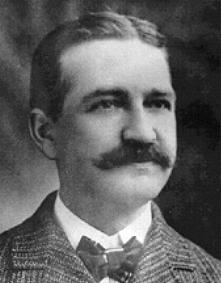
L. Frank Baum (15 May 1856 - 6 May 1919) was an American author of children's books, best known for writing The Wonderful Wizard of Oz. He wrote thirteen novel sequels, nine other fantasy novels, and a plethora of other works (55 novels in total (plus four "lost" novels), 82 short stories, over 200 poems, an unknown number of scripts, and many miscellaneous writings), and made numerous attempts to bring his works to the stage and screen. His works predicted such century-later commonplaces as television, laptop computers (The Master Key), wireless telephones (Tik-Tok of Oz), and the ubiquity of advertising on clothing (Aunt Jane's Nieces at Work).
Cheech and Chong
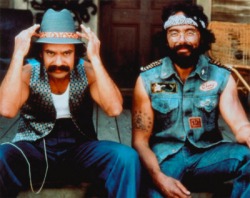
Cheech & Chong are a comedy duo consisting of Richard "Cheech" Marin and Tommy Chong, who found a wide audience in the 1970s and 1980s for their stand-up routines, which were based on the hippie and free love era, and especially drug culture movements, most notably their love for cannabis.
Jim Varney
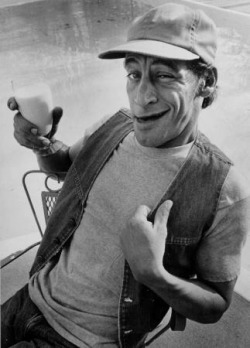
James Albert "Jim" Varney, Jr. (June 15, 1949 – February 10, 2000) was an American actor, voice artist, and comedian, best known for playing Ernest P. Worrell.
The character was used in numerous television commercial campaigns and movies in the following years, giving Varney fame worldwide.
Varney was best known for his slapstick style and his portrayal of "redneck" stereotypes in a friendly, approachable way.
The character was used in numerous television commercial campaigns and movies in the following years, giving Varney fame worldwide.
Varney was best known for his slapstick style and his portrayal of "redneck" stereotypes in a friendly, approachable way.
Wolfman Jack
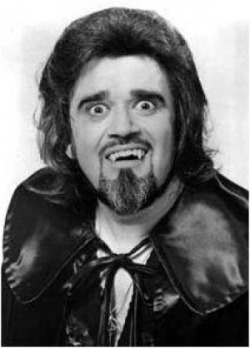
Wolfman Jack was a gravelly-voiced, American disc jockey who became world famous in the 1960s and 1970s, and whose real name was Robert Weston Smith (January 21, 1938 – July 1, 1995).
John Kricfalusi
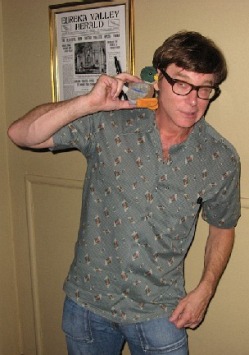
John Kricfalusi (pronounced Kris-falusi, born Michael John Kricfalusi), better known as John K, is a Canadian animator. He is creator of The Ren & Stimpy Show, The Ripping Friends animated series, and Weekend Pussy Hunt, which was billed as "the world's first interactive web-based cartoon," as well as the founder of animation studio Spümcø International.
Tex Avery
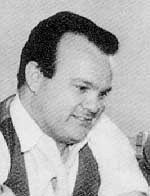
Frederick Bean "Fred/Tex" Avery (February 26, 1908 – August 26, 1980) was an American animator, cartoonist, voice actor and director, famous for producing animated cartoons during The Golden Age of Hollywood animation. He did his most significant work for the Warner Bros. and Metro-Goldwyn-Mayer studios, creating the characters of Daffy Duck, Bugs Bunny, Droopy, Screwy Squirrel, and developing Porky Pig and Chilly Willy (this last one for the Walter Lantz Studio) into regular cartoon characters. His influence was found in almost all of the animated cartoon series by various studios in the 1940s and 1950s.
Avery's style of directing encouraged animators to stretch the boundaries of the medium to do things in a cartoon that could not be done in the world of live-action film. An often-quoted line about Avery's cartoons was, "In a cartoon you can do anything," He also performed a great deal of voice work in his cartoons, usually throwaway bits (e.g. the Santa Claus seen briefly in Who Killed Who?), but Tex did fill in for Bill Thompson as Droopy, although the individual cartoons where Avery did this have never been specified.
Avery's style of directing encouraged animators to stretch the boundaries of the medium to do things in a cartoon that could not be done in the world of live-action film. An often-quoted line about Avery's cartoons was, "In a cartoon you can do anything," He also performed a great deal of voice work in his cartoons, usually throwaway bits (e.g. the Santa Claus seen briefly in Who Killed Who?), but Tex did fill in for Bill Thompson as Droopy, although the individual cartoons where Avery did this have never been specified.
Vincent Price
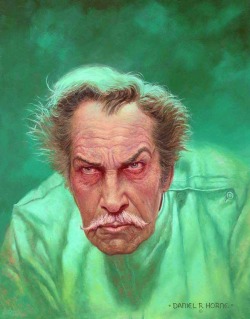
Vincent Leonard Price II (May 27, 1911 – October 25, 1993) was an American actor, well known for his distinctive voice and serio-comic attitude in a series of horror films made in the latter part of his career.
Lenny Bruce
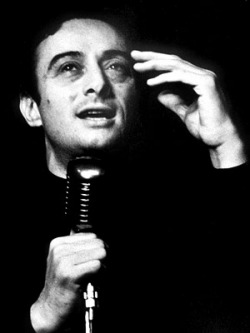
Leonard Alfred Schneider (October 13, 1925 – August 3, 1966), better known by the stage name Lenny Bruce, was an extremely influential and controversial American stand-up comedian, writer, social critic and satirist of the 1950s and 1960s, whose comedy revolved heavily around the social stigmas and taboos of the era in which he lived. His 1964 conviction in an obscenity trial was followed by a posthumous pardon, the first in New York state history.
Redd Foxx
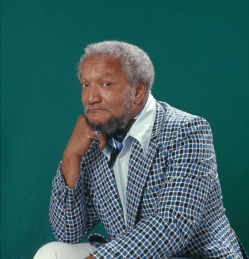
John Elroy Sanford (December 9, 1922 – October 11, 1991), better known by his stage name Redd Foxx, was an American comedian and actor, best known for his starring role on the sitcom Sanford and Son.
Andy Kaufman
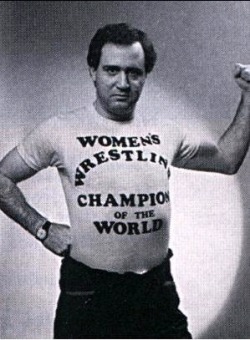
Andrew Geoffrey "Andy" Kaufman (January 17, 1949 – May 16, 1984) was an American entertainer, actor and performance artist. While often referred to as a comedian, Kaufman did not consider himself one. He disdained telling jokes and engaging in comedy as it was traditionally understood, referring to himself instead as a "song-and-dance man."
Chris Farley
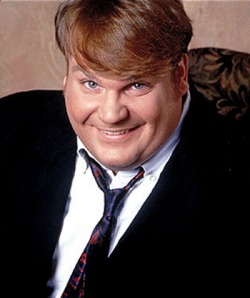
Christopher Crosby "Chris" Farley (February 15, 1964 – December 18, 1997) was an American comedian and actor. Farley was a member of Chicago's The Second City Theatre and the cast of the NBC sketch comedy show Saturday Night Live. He also starred in a string of successful comedy films in the 1990s including Tommy Boy, Black Sheep, and Beverly Hills Ninja before his death on December 18, 1997 in his Chicago apartment of cardiac arrest caused by a drug overdose.
John Belushi
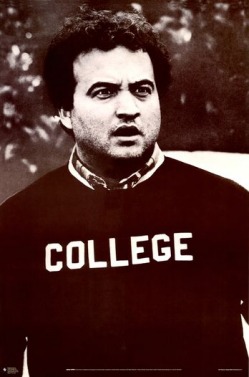
John Adam Belushi (January 24, 1949 – March 5, 1982) was an American comedian, actor, and musician best known as the original cast member of the NBC sketch comedy show Saturday Night Live, and starred in the films National Lampoon's Animal House and The Blues Brothers. He was the older brother of James Belushi.
Robin Williams
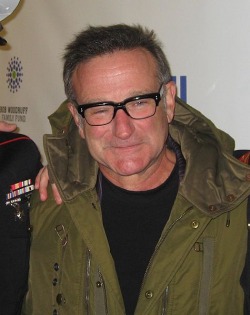
Robin McLaurim Williams (born July 21, 1951) is an American actor and comedian.
Rising to fame with his role as the alien Mork in the TV series Mork and Mindy, and later stand-up comedy work, Williams has performed in many feature films since 1980. He won the Academy Award for Best Supporting Actor for his performance in the 1997 film Good Will Hunting. He has also won three Golden Globes, two Screen Actors Guild Awards and three Grammy Awards.
Rising to fame with his role as the alien Mork in the TV series Mork and Mindy, and later stand-up comedy work, Williams has performed in many feature films since 1980. He won the Academy Award for Best Supporting Actor for his performance in the 1997 film Good Will Hunting. He has also won three Golden Globes, two Screen Actors Guild Awards and three Grammy Awards.
John Candy
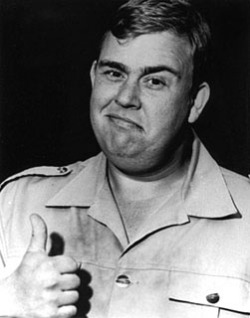
John Franklin Candy (October 31, 1950 – March 4, 1994) was a Canadian comedian and actor. He rose to fame as a member of the Toronto, Ontario branch of The Second City and for his role in the 1981 comedy Stripes. One of his most renowned onscreen performances was that of Del Griffith in the John Hughes comedy Planes, Trains and Automobiles.
George Carlin
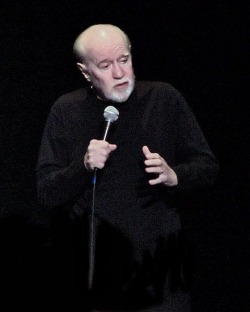
George Denis Patrick Carlin (May 12, 1937 – June 22, 2008) was an American stand-up comedian, social critic, actor, and author, who won five Grammy Awards for his comedy albums.
Carlin was noted for his black humor as well as his thoughts on politics, the English language, psychology, religion, and various taboo subjects. Carlin and his "Seven Dirty Words" comedy routine were central to the 1978 U.S. Supreme Court case F.C.C. v. Pacifica Foundation, in which a narrow 5–4 decision by the justices affirmed the government's power to regulate indecent material on the public airwaves.
The first of his 14 stand-up comedy specials for HBO was filmed in 1977. In the 1990s and 2000s, Carlin's routines focused on the flaws in modern-day America. He often commented on contemporary political issues in the United States and satirized the excesses of American culture. His final HBO special, It's Bad for Ya, was filmed less than four months before his death.
Carlin placed second on the Comedy Central cable television network list of the 100 greatest stand-up comedians, ahead of Lenny Bruce and behind Richard Pryor. He was a frequent performer and guest host on The Tonight Show during the three-decade Johnny Carson era, and hosted the first episode of Saturday Night Live.
Carlin was noted for his black humor as well as his thoughts on politics, the English language, psychology, religion, and various taboo subjects. Carlin and his "Seven Dirty Words" comedy routine were central to the 1978 U.S. Supreme Court case F.C.C. v. Pacifica Foundation, in which a narrow 5–4 decision by the justices affirmed the government's power to regulate indecent material on the public airwaves.
The first of his 14 stand-up comedy specials for HBO was filmed in 1977. In the 1990s and 2000s, Carlin's routines focused on the flaws in modern-day America. He often commented on contemporary political issues in the United States and satirized the excesses of American culture. His final HBO special, It's Bad for Ya, was filmed less than four months before his death.
Carlin placed second on the Comedy Central cable television network list of the 100 greatest stand-up comedians, ahead of Lenny Bruce and behind Richard Pryor. He was a frequent performer and guest host on The Tonight Show during the three-decade Johnny Carson era, and hosted the first episode of Saturday Night Live.
Richard Pryor
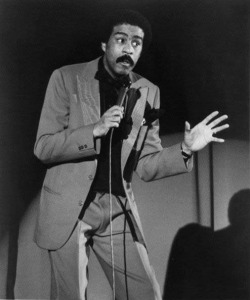
.Richard Franklin Lennox Thomas Pryor III (December 1, 1940 – December 10, 2005) was an American stand-up comedian, actor, and writer. Pryor was known for uncompromising examinations of racism and topical contemporary issues, which employed colorful, vulgar, and profane language as well as racial epithets. He reached a broad audience with his trenchant observations and storytelling style. He is widely regarded as one of the most important stand-up comedians: Jerry Seinfeld called Pryor "The Picasso of our profession"; Bob Newhart has called Pryor "the seminal comedian of the last 50 years."
His body of work includes the concert movies and recordings Richard Pryor: Live & Smokin' (1971), That Nigger's Crazy (1974), ...Is It Something I Said? (1975), Bicentennial Nigger (1976), Richard Pryor: Live in Concert (1979), Richard Pryor: Live on the Sunset Strip (1982), and Richard Pryor: Here and Now (1983). He also starred in numerous films as an actor such as Superman III (1983) but was usually in comedies such as Silver Streak (1976), and occasionally in dramatic roles, such as Paul Schrader's film Blue Collar (1978). He collaborated on many projects with actor Gene Wilder.
Pryor won an Emmy Award in 1973, and five Grammy Awards in 1974, 1975, 1976, 1981, and 1982. In 1974, he also won two American Academy of Humor awards and the Writers Guild of America Award.
Pryor is listed at number one on Comedy Central's list of all-time greatest stand-up comedians.
His body of work includes the concert movies and recordings Richard Pryor: Live & Smokin' (1971), That Nigger's Crazy (1974), ...Is It Something I Said? (1975), Bicentennial Nigger (1976), Richard Pryor: Live in Concert (1979), Richard Pryor: Live on the Sunset Strip (1982), and Richard Pryor: Here and Now (1983). He also starred in numerous films as an actor such as Superman III (1983) but was usually in comedies such as Silver Streak (1976), and occasionally in dramatic roles, such as Paul Schrader's film Blue Collar (1978). He collaborated on many projects with actor Gene Wilder.
Pryor won an Emmy Award in 1973, and five Grammy Awards in 1974, 1975, 1976, 1981, and 1982. In 1974, he also won two American Academy of Humor awards and the Writers Guild of America Award.
Pryor is listed at number one on Comedy Central's list of all-time greatest stand-up comedians.
Steven Wright
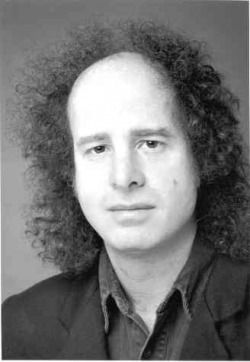
Steven Alexander Wright (born December 6, 1955) is an American comedian, actor and writer. He is known for his distinctly lethargic voice and slow, deadpan delivery of ironic, philosophical and sometimes nonsensical jokes and one-liners with contrived situations.
Rodney Dangerfield
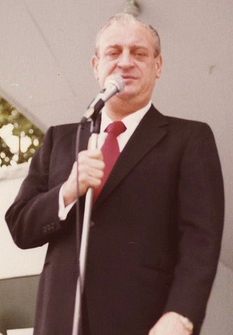
Rodney Dangerfield (November 22, 1921 – October 5, 2004), born Jacob Cohen, was an American comedian and actor, known for the catchphrases "I don't get no respect" or "I get no respect" and his monologues on that theme. He is also famous for his 1980s film roles, notably in Caddyshack and Back To School.
Sam Kinison
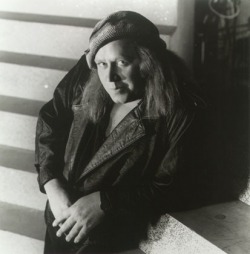
Samuel Burl "Sam" Kinison (December 8, 1953 – April 10, 1992) was an American stand-up comedian and actor. Kinison was known for his intense, harsh humor. A former revival-style preacher, he performed stand-up routines that were most often characterized by an intense style, similar to revival preachers, punctuated by his trademark scream.
Johnny Carson
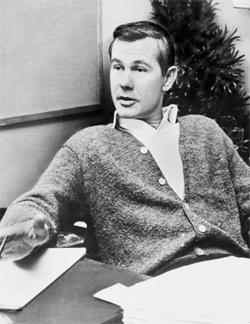
John William “Johnny” Carson (October 23, 1925 – January 23, 2005) was an American television host and comedian, known as host of The Tonight Show Starring Johnny Carson for 30 years (1962–1992). Carson received six Emmy Awards including the Governor Award and a 1985 Peabody Award; he was inducted into the Television Academy Hall of Fame in 1987. He was awarded the Presidential Medal of Freedom in 1992, and received Kennedy Center Honors in 1993.
Although his show was already massively successful by the end of the 1960s, it was during the 1970s that he became iconic of American society and the "best guest" in almost all American families up until his retirement in 1992. Also, Johnny Carson is credited to have molded modern television shows the way we know them now, transitioning the format from Ed Sullivan's era of post-war variety display where the host was merely an announcer of acts, to today's standards, and the blueprint he gave to the figure of the comedic host is now easily recognizable in the likes of David Letterman, Jay Leno, Conan O'Brien, and a multitude of similar personalities that are still struggling to fill his longtime vacant position.
Although his show was already massively successful by the end of the 1960s, it was during the 1970s that he became iconic of American society and the "best guest" in almost all American families up until his retirement in 1992. Also, Johnny Carson is credited to have molded modern television shows the way we know them now, transitioning the format from Ed Sullivan's era of post-war variety display where the host was merely an announcer of acts, to today's standards, and the blueprint he gave to the figure of the comedic host is now easily recognizable in the likes of David Letterman, Jay Leno, Conan O'Brien, and a multitude of similar personalities that are still struggling to fill his longtime vacant position.
